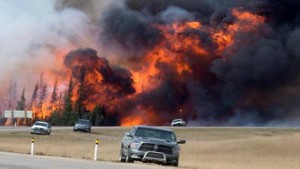 BETTER remuneration was what lured former Kingston port worker Anthony Francis to Fort McMurray, a city of vast deposits of oil sands in north-east Alberta — Canada’s largest oil-producing province. That was three years ago.
BETTER remuneration was what lured former Kingston port worker Anthony Francis to Fort McMurray, a city of vast deposits of oil sands in north-east Alberta — Canada’s largest oil-producing province. That was three years ago.
Today, the 45-year-old heavy-duty mechanic will readily tell you that the dream of higher wages and a better quality of life for himself and family has been somewhat realised, pushing him to harbour even higher aspirations. “It has been good. I work, pay my bills here and back home (Jamaica) and am able to save. I can’t complain,” he told the
Jamaica Observer yesterday.
“One of the best things, too, is the access to credit. I arrived here on February 6, 2013, and within couple of days I was driving a brand new car which I got with only an offer letter from my employer. In Jamaica, you only get a regular credit card,” he added. However, what Francis didn’t bargain for is the displacement that has come with a massive bush fire that has been raging in and around Fort McMurray since last week, forcing the evacuation of the city’s nearly 80,000 dwellers.
“It was like Armageddon,” Francis said, likening the tragedy to scenes normally depicted in movies. “Just imagine a fire racing on a broken gas pipe with the howling sounds and cracking of burnt wood,” he explained from a dorm room 655 kilometres away at Ambrose University College in South West Calgary, where he and more than 200 of Fort McMurray’s evacuees have been given shelter after being airlifted from the burning city.
“It was scary, but I tried to be calm. And it was a blessing that my family is in Jamaica while the city goes through this,” he added. Francis’ description of the disaster has been told repeatedly over the last few days in newscasts and through scores of videos that have surfaced on the Internet. The pictures are startling: fleeing residents trapped in gridlock on smoke-blanketed highways surrounded by burning trees and bushes.
Up until yesterday, Albertan authorities had still not pinpointed the cause of the fire — which began in the forests surrounding the city, resulted in the deaths of more than a dozen people (mostly in road crashes), and had grown three times the size of Alberta’s sprawling capital of Edmonton. Francis told the
Observer that he would have never imagined that the fire, which was first detected two Thursdays ago, would have reached the scale it is now. He recalled being at his home last week Wednesday and tuned in to television and radio updates that were being given at intervals. He said he noticed that the smoke was getting thicker and the fire was closing in on his neighbourhood. Suddenly, his backyard was on fire and so were parts of his neighbour’s yard.
He said this forced him to venture north of the city, on advice of the authorities, at a camp that was set up by his employer for workers. “We were being taken care of at the camp, but heading north was a big risk,” he shared. A risk it was, indeed, as two days later — with the wind changing direction and the fire now heading north — he was among 6,500 people who had to be airlifted by Sunjet to safety.
Today, Francis is grateful for the help he is receiving in Calgary. “I have a room for myself. People from Red Cross, the university staff, and the emergency management people are here. I get three meals a day, and a bus pass… I get the basic necessities,” he shared. “Everybody is comfortable and we are happy to be alive. The children among us have been placed in different schools here to finish the term,” he added.
But while his needs are being taken care of in Calgary, Francis’ main concern is returning to Fort McMurray. He is not sure how his house has fared and he wants to return to work. However, that may not happen for now. “They told me that it will be three months before I can return,” he told the Obsever. “That’s a long time from now.”
